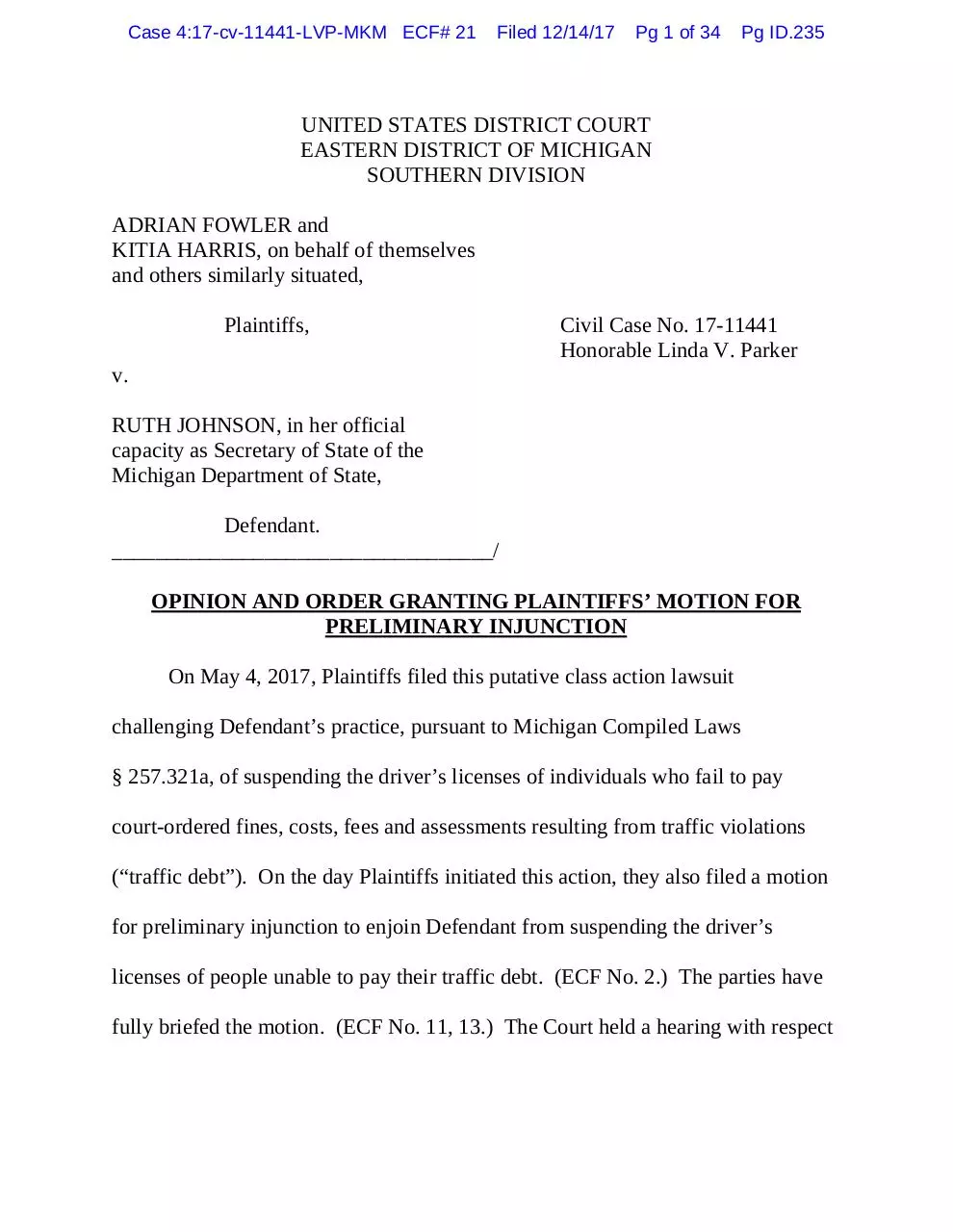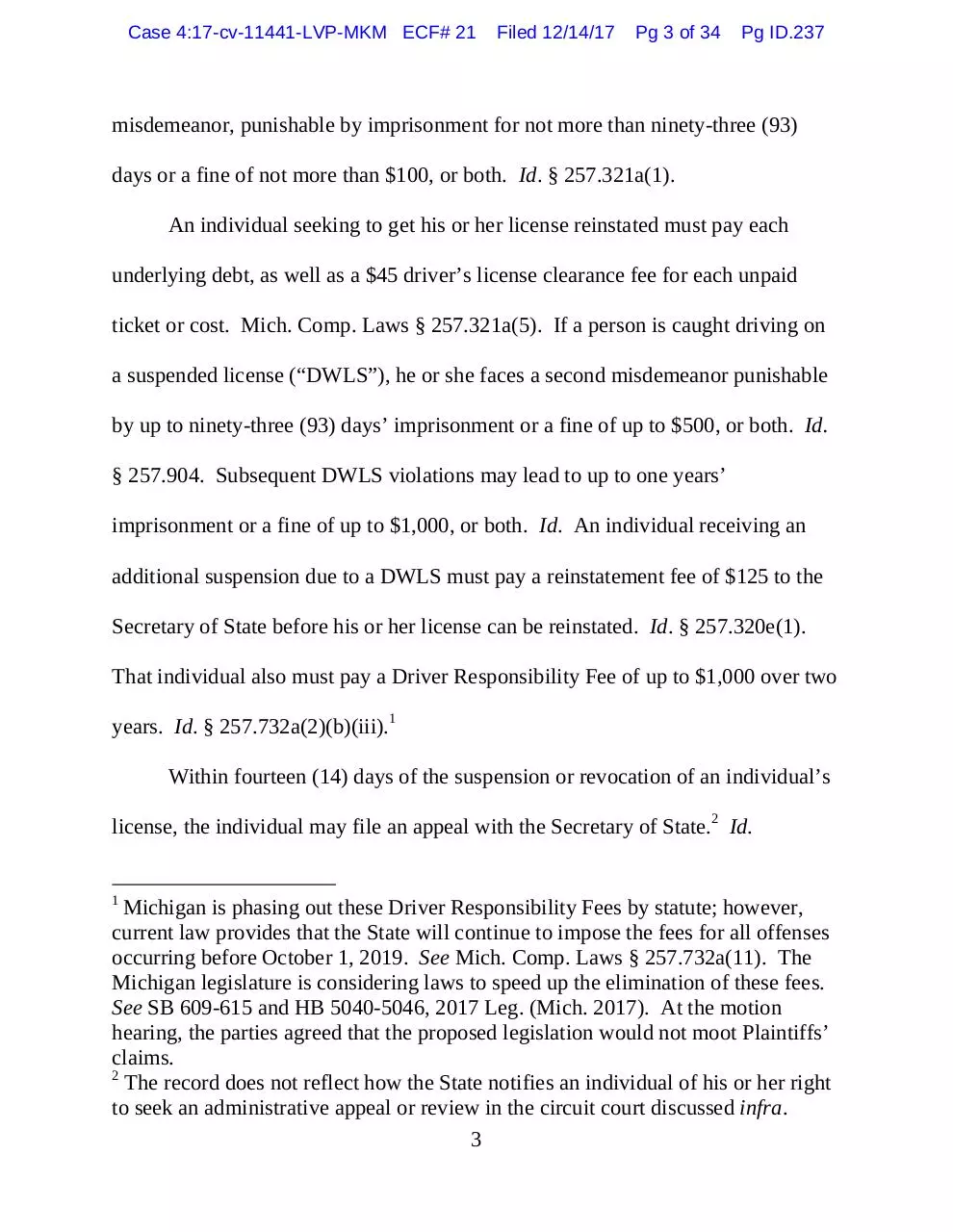Dist. Ct. PI Opinion:Order (PDF)
File information
Title: Microsoft Word - 17-11441.preliminaryinj.op&order.revised.docx
Author: loury
This PDF 1.5 document has been generated by PScript5.dll Version 5.2.2 / Acrobat Distiller 11.0 (Windows); modified using iText 2.1.7 by 1T3XT, and has been sent on pdf-archive.com on 08/01/2018 at 17:17, from IP address 74.93.x.x.
The current document download page has been viewed 398 times.
File size: 107.51 KB (34 pages).
Privacy: public file





File preview
Case 4:17-cv-11441-LVP-MKM ECF# 21
Filed 12/14/17
Pg 1 of 34
Pg ID.235
UNITED STATES DISTRICT COURT
EASTERN DISTRICT OF MICHIGAN
SOUTHERN DIVISION
ADRIAN FOWLER and
KITIA HARRIS, on behalf of themselves
and others similarly situated,
Plaintiffs,
Civil Case No. 17-11441
Honorable Linda V. Parker
v.
RUTH JOHNSON, in her official
capacity as Secretary of State of the
Michigan Department of State,
Defendant.
___________________________________/
OPINION AND ORDER GRANTING PLAINTIFFS’ MOTION FOR
PRELIMINARY INJUNCTION
On May 4, 2017, Plaintiffs filed this putative class action lawsuit
challenging Defendant’s practice, pursuant to Michigan Compiled Laws
§ 257.321a, of suspending the driver’s licenses of individuals who fail to pay
court-ordered fines, costs, fees and assessments resulting from traffic violations
(“traffic debt”). On the day Plaintiffs initiated this action, they also filed a motion
for preliminary injunction to enjoin Defendant from suspending the driver’s
licenses of people unable to pay their traffic debt. (ECF No. 2.) The parties have
fully briefed the motion. (ECF No. 11, 13.) The Court held a hearing with respect
Case 4:17-cv-11441-LVP-MKM ECF# 21
Filed 12/14/17
Pg 2 of 34
Pg ID.236
to Plaintiffs’ motion on November 15, 2017. For the reasons that follow, the Court
is now granting the motion.
I.
Background
Under Michigan’s Motor Vehicle Code, the failure to follow certain traffic
laws results in a civil infraction that includes a fine. For each civil infraction, a
judge can order costs of up to $100 and, in the majority of cases, must also impose
a mandatory justice system assessment of $40. Mich. Comp. Laws § 257.907(4),
(13). Any fine, cost, or fee remaining unpaid after fifty-six (56) days incurs a
twenty-percent (20%) late fee. Id. § 600.4803.
Michigan law provides that twenty-eight (28) days after a person fails to
answer a traffic citation or notice to appear in court for a citation, the court must
notify the person that the failure within fourteen (14) days to appear in court or
comply with an order or judgment of the court (including the failure to pay all
fines, costs, fees, and assessments) will result in the Secretary of State suspending
his or her driver’s license. Mich. Comp. Laws § 257.321a(2). The statute requires
the Secretary of State to “immediately suspend” a person’s license if the person
does not appear or payment is not made within fourteen (14) days and to notify the
person of the suspension by regular mail at his or her last known address. Id.
Additionally, an individual who fails to pay their traffic debt is guilty of a
2
Case 4:17-cv-11441-LVP-MKM ECF# 21
Filed 12/14/17
Pg 3 of 34
Pg ID.237
misdemeanor, punishable by imprisonment for not more than ninety-three (93)
days or a fine of not more than $100, or both. Id. § 257.321a(1).
An individual seeking to get his or her license reinstated must pay each
underlying debt, as well as a $45 driver’s license clearance fee for each unpaid
ticket or cost. Mich. Comp. Laws § 257.321a(5). If a person is caught driving on
a suspended license (“DWLS”), he or she faces a second misdemeanor punishable
by up to ninety-three (93) days’ imprisonment or a fine of up to $500, or both. Id.
§ 257.904. Subsequent DWLS violations may lead to up to one years’
imprisonment or a fine of up to $1,000, or both. Id. An individual receiving an
additional suspension due to a DWLS must pay a reinstatement fee of $125 to the
Secretary of State before his or her license can be reinstated. Id. § 257.320e(1).
That individual also must pay a Driver Responsibility Fee of up to $1,000 over two
years. Id. § 257.732a(2)(b)(iii).1
Within fourteen (14) days of the suspension or revocation of an individual’s
license, the individual may file an appeal with the Secretary of State.2 Id.
1
Michigan is phasing out these Driver Responsibility Fees by statute; however,
current law provides that the State will continue to impose the fees for all offenses
occurring before October 1, 2019. See Mich. Comp. Laws § 257.732a(11). The
Michigan legislature is considering laws to speed up the elimination of these fees.
See SB 609-615 and HB 5040-5046, 2017 Leg. (Mich. 2017). At the motion
hearing, the parties agreed that the proposed legislation would not moot Plaintiffs’
claims.
2
The record does not reflect how the State notifies an individual of his or her right
to seek an administrative appeal or review in the circuit court discussed infra.
3
Case 4:17-cv-11441-LVP-MKM ECF# 21
Filed 12/14/17
Pg 4 of 34
Pg ID.238
§ 257.322(2). The appeal must be in writing. Id. The Secretary of State then is
required to appoint a hearing officer to hear the appeal. Id. § 257.322(1). After the
administrative appeal is concluded, the individual may petition for review in a
Michigan circuit court. Id. § 257.323. The petition must be filed within sixtythree (63) days from the hearing officer’s determination, or within one hundred and
eighty two (182) days if good cause is shown. The circuit court may set aside the
Secretary of State’s determination if it finds inter alia that the individual’s
“substantial rights have been prejudiced because the determination is … [i]n
violation of the Constitution of the United States …” Id. § 257.323(4)(a)(i).
Plaintiffs Adrian Fowler and Kitia Harris are Michigan residents who claim
to have had their driver’s licenses suspended pursuant to the aforementioned
statutory provisions. While living in Georgia from 2008 to 2012, Ms. Fowler was
issued three tickets for civil traffic infractions, which she was not able to pay.
(Fowler Decl. ¶ 4, ECF No. 2-1.) When she moved back to Michigan in 2012, Ms.
Fowler tried to renew her Michigan driver’s license and was informed that it was
suspended because she had not paid her Georgia court debts. (Id. ¶ 5.) According
to Defendant, Ms. Fowler was not able to renew her license because Michigan law
precludes the Secretary of State from issuing a license to someone whose license is
4
Case 4:17-cv-11441-LVP-MKM ECF# 21
Filed 12/14/17
Pg 5 of 34
Pg ID.239
revoked or suspended in another state.3 (Def.’s Resp. Br. at 3, ECF No. 11 at Pg
ID 117.) Defendant indicates that Georgia suspended Ms. Fowler’s license for
nonpayment of court debts.4 (Id.)
Ms. Fowler is the sole caretaker of her three-year-old daughter. (Fowler
Decl. ¶ 2.) They reside in Detroit. (Id. ¶ 1.) In winter 2013, during an ice storm,
Ms. Fowler’s daughter developed a high fever. (Id. ¶ 6.) Fearing that the ice
would inhibit an ambulance from quickly arriving to transport her daughter to the
hospital, Ms. Fowler decided to drive her there. (Id.) A police officer stopped Ms.
Fowler for speeding in Ferndale, and issued her a speeding ticket and DWLS
citation. (Id.) The total cost was almost $600. (Id.)
Ms. Fowler claims that when she went to the Ferndale courthouse to report
that she was unable to pay the $600, she was told that a warrant would be issued
for her arrest if she did not return in three weeks with the full amount. (Id. ¶ 7.)
As of May 3, 2017, Ms. Fowler also had unpaid fines in Eastpointe for $752 and
3
Michigan Compiled Laws Section 257.303(1) provides, in relevant part: “The
secretary of state shall not issue a license under this act to any of the following
persons: … (c) A person whose license is suspended, revoked, denied, or canceled
in any state.” Because Defendant did not renew Ms. Fowler’s Michigan license
when she returned from Georgia because of the suspension of her driver’s license
there, Defendant has not suspended Ms. Fowler’s license according to the scheme
Plaintiffs now challenge. For that reason, she most likely lacks standing to pursue
this lawsuit.
4
Defendant attaches a certified copy of Ms. Fowler’s driving record to its response
brief, which it claims reflects her suspension in Georgia for failing to appear in
court on two counts. (See Def.’s Resp., Ex. 1.)
5
Case 4:17-cv-11441-LVP-MKM ECF# 21
Filed 12/14/17
Pg 6 of 34
Pg ID.240
Oak Park for $703. (Id. ¶ 9.) She indicates that those fees are the result of
warrants issued when she missed court dates. (Id. ¶ 8.) Ms. Fowler’s driving
record reflects a citation issued in Eastpointe for driving while her license was
suspended and multiple traffic violations in Oak Park (prohibited turn, disobeying
a stop sign, and failing to display a valid license). (Def.’s Resp., Ex. 1.)
Ms. Fowler claims that she is unable to pay these fines, but that the lack of a
driver’s license severely hampers her ability to find better employment and any
chance that she will be able to pay them in the future. (Fowler Decl. ¶¶ 11, 12.)
Ms. Fowler currently works part-time for a security company, earning $8.90 per
hour or about $712 per month. (Id. ¶ 3.) Each month, she pays $850 in rent and an
additional $500 to $600 for utilities, groceries, and other everyday needs for
herself and her daughter. (Id. ¶ 11.) Ms. Fowler was offered a $12.50 per hour job
with Blue Chip Endeavors. (Id. ¶ 15.) She had to turn it down, however, because
it required her to travel throughout the metropolitan area, which she cannot do
without a valid license and viable public transportation options between the city
and suburbs.5
Ms. Harris is a single mother with an eight-year-old daughter. (Harris Decl.
¶ 2.) They reside in Detroit. (Id. 1.) In November 2014, Ms. Harris was diagnosed
5
Plaintiffs contend that Detroit’s public transportation system is “notoriously
inadequate” and they provide evidence reflecting that the city’s bus system is
unreliable and often requires long commutes. (Pls.’ Br. in Supp. of Mot. at 9-10,
ECF No. 2 at Pg ID 58-59; Exs. 4, 5.)
6
Case 4:17-cv-11441-LVP-MKM ECF# 21
Filed 12/14/17
Pg 7 of 34
Pg ID.241
with interstitial cystitis, a chronic condition that prevents her from working. (Id.
¶ 4.) Ms. Harris previously worked at Blue Cross Blue Shield in Rochester,
Michigan. (Id. ¶ 5.) She was fired in December 2015, however, because her
medical condition interfered with her job performance. (Id.) She has not held a
job since then. (Id.)
In October 2016, a police officer in Ferndale stopped Ms. Harris and issued
her a ticket for “impeding traffic.” (Id. ¶ 7.) The fine was $150, which Ms. Harris
claims she is not able to pay. (Id.) About a month later, after receiving notices
that her payment was due, Ms. Harris received a notice stating that her driver’s
license had been suspended. (Id. ¶ 8.) Ms. Harris must pay a total of $276 to have
her license reinstated. (Id. ¶ 9.)
Each month, Ms. Harris pays $600 in rent, $350 for food, and $400 for her
utilities and other living expenses. (Id. ¶ 10.) She also has to pay her landlord
$100 each month to build up a security deposit. (Id.) Any additional income Ms.
Harris has goes to reducing her medical debt and buying clothing and school
supplies for her daughter. (Id.) Ms. Harris receives $938 per month in disability
benefits, plus an additional $280 in benefits for her daughter, and $300 in food
stamps. (Id. ¶ 6.)
Ms. Harris’ medical condition requires her to have regular medical
appointments, usually bi-weekly. (Id. ¶ 11.) Her doctor’s office is a thirty-minute
7
Case 4:17-cv-11441-LVP-MKM ECF# 21
Filed 12/14/17
Pg 8 of 34
Pg ID.242
drive from her home. (Id.) Ms. Harris cannot ride the bus, because her medical
condition makes it unsafe for her to stand for more than a few minutes. (Id. ¶ 12.)
Lacking a driver’s license, Ms. Harris must pay people to drive her where she
needs to go. (Id.) Because she relies on other people for rides, Ms. Harris is
frequently late for her medical appointments and often has to cancel or reschedule
her appointments at the last minute, which negatively impacts her health. (Id.
¶ 13.)
II.
Defendant’s Jurisdictional Arguments
In response to Plaintiffs’ motion, Defendant first argues that this Court lacks
or should decline to exercise jurisdiction over this matter. The Court must address
these arguments first.
A.
The Rooker-Feldman Doctrine
Defendant contends that this Court lacks subject matter jurisdiction to
adjudicate Plaintiffs’ claims under the Rooker-Feldman doctrine because “they are
at bottom launching a collateral attack against valid state court orders.” (Def.’s
Resp. Br. at 8-9, ECF No. 11 at Pg ID 122-23.) Contrary to Defendant’s assertion,
Plaintiffs are not collaterally attacking any state court order.
As Plaintiffs’ counsel made clear at the motion hearing, Plaintiffs are not
contesting their liability for violating the traffic laws for which they received
citations. Nor are they challenging the imposition of any fines, costs, or
8
Case 4:17-cv-11441-LVP-MKM ECF# 21
Filed 12/14/17
Pg 9 of 34
Pg ID.243
assessments resulting from those violations. Instead, Plaintiffs are challenging
Defendant’s revocation of their driver’s licenses for failing to pay their traffic debt
without consideration of their willfulness or ability to pay. The Rooker-Feldman
doctrine does not extend to Plaintiffs’ claims.
The Supreme Court made this clear in Exxon Mobil Corporation v. Saudi
Basic Industries Corporation, 544 U.S. 280 (2006), when it stated:
Variously interpreted in the lower courts, the doctrine has
sometimes been construed to extend far beyond the
contours of the Rooker and Feldman cases, overriding
Congress’ conferral of federal-court jurisdiction
concurrent with jurisdiction exercised by state courts, and
superseding the ordinary application of preclusion law
pursuant to 28 U.S.C. § 1738.
Id. at 283. Since Exxon Mobil, the Sixth Circuit “has tightened the scope of
Rooker-Feldman[,]” explaining that it “is a doctrine with only limited application.”
Kovacic v. Cuyahoga Cty. Dep’t of Children & Family Servs., 606 F.3d 301, 309
(6th Cir. 2010) (quoting Coles v. Granville, 448 F.3d 853, 857 (6th Cir. 2006)).
Specifically, as the Exxon Mobil Court explained,
The Rooker-Feldman doctrine we hold today, is confined
to cases of the kind from which the doctrine acquired its
name: cases brought by state-court losers complaining of
injuries caused by state-court judgments rendered before
the district court proceedings commences and inviting
district court review and rejection of those judgments.
544 U.S. at 284. The Sixth Circuit has “explained that the pertinent inquiry after
Exxon is whether the ‘source of the injury’ upon which [the] plaintiff bases his
9
Download Dist. Ct. PI Opinion:Order
Dist. Ct. PI Opinion:Order.pdf (PDF, 107.51 KB)
Download PDF
Share this file on social networks
Link to this page
Permanent link
Use the permanent link to the download page to share your document on Facebook, Twitter, LinkedIn, or directly with a contact by e-Mail, Messenger, Whatsapp, Line..
Short link
Use the short link to share your document on Twitter or by text message (SMS)
HTML Code
Copy the following HTML code to share your document on a Website or Blog
QR Code to this page

This file has been shared publicly by a user of PDF Archive.
Document ID: 0000718380.